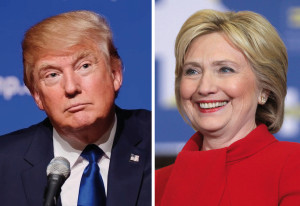Phoebe Barr ’19: In this critical and polarizing election season marked by heated rhetoric on both Democratic and Republican sides, many politically active students may feel discontented because they are unable to cast votes for their party’s candidate. “I think it can be really frustrating for students to watch the election progress without them really being able to do anything concrete,” said Emma Sargent ‘18, President of the Young Democrats club. In response to this climate, History teacher Rob Trumbull set up a mock election on November 8th.

“We would like to gauge the student population here,” Trumbull said prior to the election, “and find out how they would vote if they were to vote.” The voting was set up to be just like casting a real ballot. “They’ll give their name, we will check their name off, give them a ballot, and then they go into the polling station and vote.” While he didn’t know if other schools were doing similar elections, he said that he “wouldn’t be surprised” because “it seems natural.”
Many students agree that political involvement is important even before voting age. Sargeant said, “In order to vote well, you need a lot of important knowledge about the governmental process and current events – and you can’t build that in a day. It’s built up over a lifetime of paying attention to what’s going on in the world and in politics.” Nick Horbowy ‘17, the president of the Young Republicans club, agreed: “These are issues that affect us personally as students, as citizens, as kids, as future adults and future voters.” He saw a positive side to the constant news coverage of the 2016 election: “People are talking about politics more than they ever have in my experience at Episcopal. We’re doing a lot of good things for raising political awareness. A lot of people are more educated than they ever have been about politics at a young age. I think that’s a really great thing.”
Sargeant also thought the results of the election could surprise and challenge students, a great way to open the door for political discussion. “A student might believe that the people around them have fairly similar political views … but when the election happens, the student might realize, ‘I’m actually in the minority, and I should speak up for my views, and I should become a more outspoken member of the community.’” She referenced a Scholium poll taken last year that stated that 60% of Episcopal responders identified as Democrats. “This was really interesting,” she said, “because for a lot of the democrats in the school, the narrative is ‘the school is so republican, nobody agrees with us,’ and, sure, it might just be 60% of kids who responded to the Scholium poll, but it did shake my view of Episcopal to see that the numbers were different than I thought. Similarly, although 20 to 30 devoted members come to Young Republicans every week, whereas two to five come to Young Democrats, still the Young Republicans’ narrative is ‘we’re in the minority, nobody agrees with us, the chapel speeches are so liberal’ – and so each political party really feels attacked and oppressed and disenfranchised.” A mock vote, she thought, might open the way for greater understanding.
However, when asked before the election about who would probably win, the answers of both an identified Democrat and Republican were similar. Horbowy said that “I think Hillary will win,” because “it seems like this school is pretty anti-Trump. Not on account of his policies, but just the way he carries himself and the comments he makes. They get very hard to defend. While we don’t like Hillary Clinton either, she’s absolutely the lesser of two evils.” Patrick Zhang ‘18, meanwhile, said that “It’s pretty close between Democrats and Republicans at this school, but I only know a few people who are actually voting for the Republican nominee, Trump – so I’m thinking that Hillary will win in our mock election.”
Regardless of the winner, Patrick Zhang was mindful of the great impact that voting has on everything else in the country, no matter your age. “Politics are important in our society,” he said. “I mean, it’s our government.”